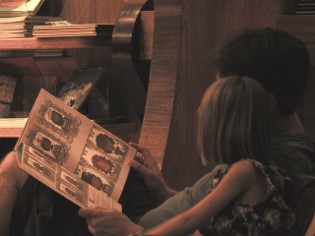Distance Learning course in developing writing skills for Children's Writing.
Do you want to write for children? Have you fun and exciting stories that children will want to read? Why not start your new career in writing with this 100 hour course on Writing for Children.
Learn to write and engage the younger reader -

- For Entertainment or Learning.
- Fantasy, Fiction, Educational Texts.
- Different ages, comics, magazines, books, web sites ....and more.
Writing for children requires an understanding of a child's mind, excellent communication skills, imagination, creativity; and an ability to bring all of these things together to create work that engages and motivates the young mind.
Completing this course enhances your ability to write for children; and raise your awareness of what the possibilities are, in the world of children's literature.
Course Structure and Lesson Content
Writing For Children is a 100 hour course comprising 10 lessons.
Lesson 1. Introduction
-
Understanding Children
- Children's thoughts
- Children's needs
- Child development.
Lesson 2. Overview of Children’s Writing
-
Categories (fiction & non fiction)
- Understanding the market place
- Analyse and understand what is needed for the different categories, etc.
Lesson 3. Conceptualisation: Conceiving a concept
-
Where and how to find inspiration/influence.
- Developing a concept
- How to plan.
Lesson 4. Children’s Writing for Periodicals
-
Children’s pages in magazines
- Newspapers, etc.
Lesson 5. Short Stories
Lesson 6. Non-Fiction
-
Texts (writing to satisfy curriculum).
- Other (e.g. nature, history, biography, hobbies).
Lesson 7. Fiction
-
Settings
- Characterisation
- Fantasy
- Science fiction
- Adventure.
Lesson 8. Picture Books and Story Books
-
Differences between types of picture books
- Age groups and picture books
Lesson 9. Editing your work
-
Grammar
- Spelling and punctuation
- Improving clarity
- Cleaning out clutter
- Expansions.
Lesson 10. Project
Write a short story, picture book or kids page for a (hypothetical) periodical.
Course Aims
- Describe children’s cognitive development and target writing to be appropriate to various developmental stages.
- Explain the nature and scope of writing for children.
- Describe the process of planning a written manuscript of children’s writing.
- Describe the planning and processes involved in writing articles for children’s magazines.
- Develop a short story for children to read.
- Discuss the specific requirements associated with writing children’s non-fiction.
- Describe the various categories of children’s fiction and the writing processes involved.
- Explain the scope and nature of literature aimed at young children.
- Explain the scope and significance of editing skills and processes for children’s writing.
- Plan, evaluate, edit and present a piece of writing for children.
What makes little children tick?
Tap into little minds and stir imaginations. Learn how to write for children across a range of genres and gain the basics of editing and improving your work. Finally, use your new skills to produce your own creative work for children.
- Free your imagination and engage a child's.
- Keeping a child amused and happy is no simple task. Children’s writing is a specialised craft. It is a rewarding, inspirational, and often demanding, branch of writing.
- Do you remember the books you read as a child?
- Did they make you feel like the world held a thousand possibilities?
- Do you want to re-create that feeling?
Welcome the magic of childhood back in to your world.
Learn with ACS
Would you like to write for children?
Do you have ideas, but don't know how to go about putting them down on paper?
Study and learn with ACS.
You can start the course at any time - just go to "It's easy to enrol" at the top of this page.
If you have any questions about our courses, please get in touch - we will be more than happy to answer any of your questions. Please phone us on (UK) 01384 442752, or (International) +44 (0) 1384 442752, or use our FREE COURSE COUNSELLING SERVICE.